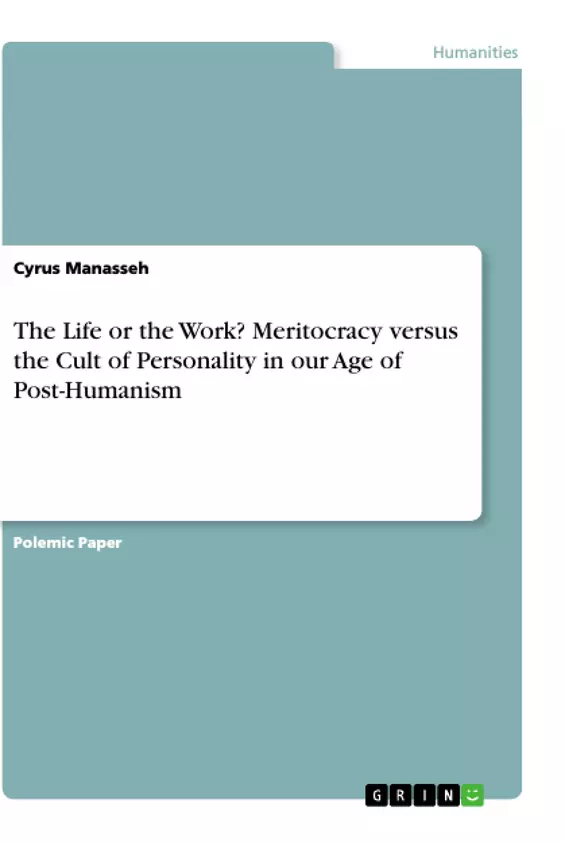This philosophy paper argues for the need to bring back a meritocracy into our culture again. It debates the question of whether authority and leadership should come from merit and achievement or whether a person's life should be the primary focus in our society for this role. To do this, it tries to show how important it is to follow the examples that were always set in place by the great masters as heroes of the past and forms a critique against the postmodernism of the 90s. In particular it criticises the media including print and online journalism.
Inhaltsverzeichnis (Table of Contents)
- Meritocracy Versus the Cult of Personality
- The Need for a Meritocracy Again
- Hierarchy
- The Cult of Personality and the Nineteenth Century Romantics
- Critical Theory from the 60 to the 90s
- The 90s and Advertising (especially in the 90s)
Zielsetzung und Themenschwerpunkte (Objectives and Key Themes)
This paper explores the shift from a focus on meritocracy and the value of creative output to a cult of personality, particularly in the context of the post-humanist age. It analyzes how this shift has influenced our perception of artists, inventors, and heroes.
- The decline of meritocracy and its consequences
- The rise of the cult of personality and its impact on artistic appreciation
- The role of advertising and media in shaping cultural perceptions
- The influence of identity politics and collectivist groups
- The evolution of the hero archetype in modern society
Zusammenfassung der Kapitel (Chapter Summaries)
- Meritocracy Versus the Cult of Personality: This chapter introduces the central thesis, arguing that the emphasis on personality and lifestyle has overshadowed the importance of artistic and intellectual achievements. It contrasts this with a previous era focused on meritocracy, where the value of a person's work was paramount.
- The Need for a Meritocracy Again: The author argues for the need to reinstate meritocracy as a guiding principle in society, emphasizing the value of achievement and intellectual contributions. The chapter explores the concept of meritocracy and its historical significance.
- Hierarchy: This chapter addresses the concept of hierarchy, asserting that it is a natural component of social organization, contrary to contemporary misconceptions. It draws upon the work of Jordan Peterson to support this perspective.
- The Cult of Personality and the Nineteenth Century Romantics: This chapter examines the roots of the cult of personality in the 19th century Romantic movement, highlighting how the lives and personalities of artists like Lord Byron overshadowed their artistic output.
- Critical Theory from the 60 to the 90s: This chapter explores how the rise of critical theory in the 1960s contributed to the shift in emphasis from meritocracy to personality. It discusses the influence of rock musicians, who emulated the artistic personalities of the Romantic era.
Schlüsselwörter (Keywords)
The key focus topics of this text are: meritocracy, cult of personality, post-humanism, identity politics, advertising, media, and the evolution of the hero archetype.
- Citar trabajo
- Professor PhD, Celta, BA Hons. Cyrus Manasseh (Autor), 2019, The Life or the Work? Meritocracy versus the Cult of Personality in our Age of Post-Humanism, Múnich, GRIN Verlag, https://www.grin.com/document/902831



